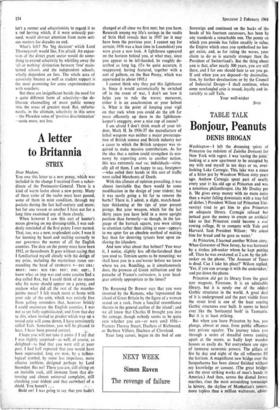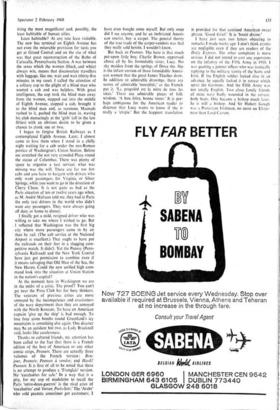Bonj our, Peanuts
TABLE TALK
• DENIS BROGAN
Washington—I left the dreaming spires of Princeton (so redolent of Zuleika Dobson) for New York with regret. I was 'casing the joint,' looking at a new apartment to be occupied by my wife and myself in ten days or so, over- looking Lake Carnegie. This lake was a cause of a bitter jest by Woodrow Wilson sixty years ago. Andrew Carnegie spent part of nearly every year in his old age at Princeton and was a notorious philanthropist. (As Mr Dooley put it, 'He gives away money with no more noise than a waiter falling downstairs with a tray full of dishes?) President Wilson (of Princeton Uni- versity) tried to get him to give Princeton an adequate library. Carnegie refused but instead gave the money to create an artificial lake so that Princeton could become a real rowing college, fit to compete with Yale and
• -Harvard. Said President Wilson : 'We asked him -for bread and he gave us water.'
At Princeton, I learned another Wilson story. When Governor of New Jersey, he was harassed by a tireless job-seeker whom he kept putting • off. Then he was awakened at 2 a.m. by the job- seeker on the phone. 'The Assessor of Taxes is dead.- Can I take his place?' Wilson replied, 'Yes, if you can arrange it with the undertaker,' and put down the phone.
Princeton did get its library from the great tyre magnate, Firestone. It is an admirable library, but it is surely one of the oddest Gothic structures in the world. A great deal of it is underground and the part visible from the street level is one of the least soaring Gothic structures ever built. It seems to bend ' over like the 'horizontal bush' in Tasmania: But it is at least striking.
But when you leave Princeton by bus, you plunge, almost at once, from public affluence into private squalor. The journey takes you through a series of dreadful towns coming apart at the seams, as badly kept wooden houses so easily do. Yet everywhere are signs of immense economic powers. The pillars of fire by day and night of the oil refineries fill the horizon. A magnificent new bridge over the Susquehanna has been almost' finished without my knowledge or consent. (The great bridges are the most striking works of man's hands in America.) And then, across the dismal Jersey marshes, rises the most astonishing townscape in history, the skyline of Manhattan's towers, more topless than a million waitresses, adver- tising the most magnificent and, possibly, the least habitable of human cities.
Least habitable? At any rate least visitable. The new bus terminal on Eighth Avenue has not even the miserable provision for taxis you get at Grand Central and on the site of what was that great reconstruction of the Baths of Caracalla, Pennsylvania Station. A war between the sexes which the women (black and white) always win, means that disconsolate travellers with luggage, like me, wait and wait (thirty-five minutes in my case). I called the attention of a solitary cop to the plight of a blind man who wanted a cab and was helpless. With great intelligence, the cop took the blind man away from the women, stepped out into the middle of Eighth Avenue, stopped a cab, brought it to the blind man and, as ravenous Maenads rushed to it, pushed the blind man in, waving his club menacingly at the 'girls' (all in the late fifties) with an obvious desire to be given a chance to clonk one or two.
I began to forgive British Railways as I contemplated Eighth Avenue. Later, I almost came to love them when I stood in a chilly night waiting for a cab under the neo-Roman portico of Washington's Union Station. Before me stretched the not very crowded Plaza round the statue of Columbus. There was plenty of space to organise a taxi service; what was missing was the will. There are far too few cabs and you have to bargain with drivers who only want passengers for Virginia or Silver Springs, while you want to go in the direction of Chevy Chase. It is not quite as bad as the Paris situation of ten or twelve years ago when, as M. Andre Malraux told me, they had in Paris the only taxi drivers in the world who didn't want any passengers. They were always going off duty or home to dinner.
I finally got a mild, resigned driver who was willing to take me where I wished to go. But , I reflected that Washington was the first big city where more passengers came in -by air than' by rail. (The cab service at the National Airport is excellent.) That ought to have put the railroads on their feet in a slugging com- petitive match. It didn't. Yet the Pennsy (Penn- sylvania Railroad) and the New York Central have just got permission to combine even if it means salvaging that Old Man of the Sea, the New Haven. Could the new unified high com- mand look into the situation at Union Station in the nation's capital?
At the moment here in Washington we are in the midst of a crisis. The proof? You can't get near the Press Club bar for busy thinkers. The veterans of previous crises are more annoyed by the incompetence and evasiveness of the navy department than they are annoyed with the North Koreans. To have an American captain 'give up the ship' is bad enough. To lose four atom bombs round Greenland's icy mountains is something else again. One disaster may be an accident but two, as Lady Bracknell said, looks like carelessness.
Thanks to cultured friends, my attention has been called to the fact that there is a French edition of the best of American or any other comic strips, Peanuts. There are actually three volumes of the French version: Bon- jour, Peanuts; Peanuts a vendre; and Hardi! Peanuts. It is first of all to be noted that there is no attempt to produce a 'Franglais' version. No 'cacahuetes for sale.' In a way that is a pity, for my sop of madeleine to recall the Paris 'entre-deux-guerres' is the rival cries of 'cacahuetes' and lntran,Paris-Soir.' The 'Arabs' who sold peanuts sometimes got customers; I
have even bought some myself. But only once did I see anyone, and he an inebriated Ameri- can tourist, buy a carpet. The general theory of the true trade of the carpet-vendors was that they really sold heroin. I wouldn't know.
But back to Peanuts. The hero is that much put-upon little boy, Charlie Brown, oppressed above all by his formidable sister, Lucy. No shy maiden from the springs of Dove she. She is the infant version of those formidable Ameri- can women that the great James Thurber drew. In addition to admirable drawings, there are scores of admirable 'moralites,' as the French put it. `La propriete est la mere de tous les vices.' There are admirable pieces of folk wisdom. 'A bon frere, bonne soeur.' It is per- haps ambiguous for the American reader to discover that Lucy wants to know if she is really a `chipie.' But the happiest translation
is provided for that sanitised American swear phrase, 'Good Grief.' It is 'bonte divine.'
I have just seen two letters objecting to remarks I made weeks ago. I don't think cranks are negligible even if they are readers of the Daily Express. The other complaint is more serious. I did not intend to cast any aspersions on the infantry of the Fifth Army in 1918. 1 was quoting a gunner officer who was ironically replying to the military vanity of the Scots and Irish. If the English soldier lacked élan in an advance, he equally lacked it in retreat which upset the Germans. And the Fifth Army was not totally English. Two close family friends of mine were badly wounded in the retreat: both Scots. One became a bishop much later, he is still a bishop. And Sir Hubert Gough was a Protestant Irishman, no more an Ulster- man than Lord Carson.



































 Previous page
Previous page